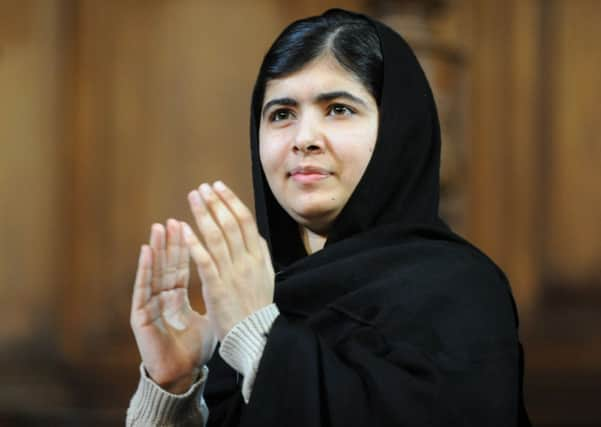Malala Yousafzai youngest ever Nobel prize winner


The 17-year-old campaigner was jointly awarded the peace prize, with Indian children’s rights activist Kailash Satyarthi, for her “heroic struggle” in favour of girls’ rights to education.
She revealed yesterday that she had been in a chemistry science class at school when she found out she had become the youngest winner of the Nobel Peace Prize.
Advertisement
Hide AdAdvertisement
Hide AdThe brave teenager, who survived being shot in the head by Islamist extremists after she campaigned for women’s education rights, said she felt “honoured and privileged” to be given the prestigious award.
Speaking from Europe’s largest public library in Birmingham, which she officially opened in September last year, Malala recalled the moment she was told she had won.
“I was in my chemistry class and we were studying all about electrolysis and the time was about 10:15am when the announcement of the Nobel Peace Prize was told,” she said. “I was not expecting I would get this award. I was pretty sure I hadn’t won it.
“Suddenly, my teacher called me and said ‘I have something important to tell you’. I was totally surprised when she told me, ‘Congratulations, you have won the Nobel Peace Prize. You are sharing with a great person who has also won it for children’s rights’.”
She said that even after finding out about the award, she decided to continue with her classes and treat it as a normal day.
Describing herself as “really honoured”, she said: “I felt more powerful and more courageous” because the award was really an encouragement for me to go forward and believe in myself.”
Malala was flown to the UK after a gunman entered the school bus she was on in Pakistan and shot her at point-blank range in October 2012.
Advertisement
Hide AdAdvertisement
Hide AdShe was targeted because she had spoken out against the Taleban and called for greater women’s rights despite Islamic fundamentalists trying to impose a strict form of sharia law in Mingora, the main town in Pakistan’s Swat valley.
Despite grievous head injuries, she survived the assassination attempt and was treated at Birmingham’s Queen Elizabeth Hospital. She has remained in the UK since with her father, mother and two brothers after making a remarkable recovery.
In a statement, the Nobel Prize committee said: “Despite her youth, Malala Yousafzai has already fought for several years for the right of girls to education, and has shown by example that children and young people, too, can contribute to improving their own situations.
“This she has done under the most dangerous circumstances.
“Through her heroic struggle she has become a leading spokesperson for girls’ rights to education.”
It also praised Mr Satyarthi for showing “great personal courage, maintaining Gandhi’s tradition” to lead peaceful protests against child exploitation.
The committee had given the award jointly because it said it was an “important point for a Hindu and a Muslim, an Indian and a Pakistani, to join in a common struggle for education and against extremism”.
Echoing their sentiments, Malala said: “We are standing together, we all want to make sure every child gets an education. This is really something great for me.
“It does not matter what is the colour of your skin. It does not matter what language you speak. It does not matter what religion you believe in. We should all treat each other as human beings and we should respect each other.
Advertisement
Hide AdAdvertisement
Hide Ad“We should all fight for our rights, for the rights of children, for the rights of women and for the rights of every human being.”
Since her ordeal, Malala has been awarded the Tipperary International Peace Award and International Children’s Peace Prize. She has also addressed the United Nations General Assembly.
By winning she took the title of youngest Nobel laureate from Lawrence Bragg, who was 25 when awarded the prize with his father for physics in 1915. The two winners beat a record list of 278 nominees which included US whistleblowers Edward Snowden and Chelsea Manning and Russian president Vladimir Putin.
Other notable winners of the prize include:
1901 Henry Dunant for founding the International Committee of the Red Cross and Frédéric Passy for being a main founder of the Inter-Parliamentary Union and also the main organiser of the first Universal Peace Congress.
1905 Bertha von Suttner became the first woman to win for her book, Lay Down Your Arms, and helping set up the prize.
1964 Martin Luther King jnr, hailed by the committee as the “first person in the western world to have shown us that a struggle can be waged without violence”.
1979 Mother Teresa, inset left, for founding the Missionaries of Charity organisation.
1986 Author Elie Wiesel, then chairman of the President’s Commission on the Holocaust.
1990 Soviet leader Mikhail Gorbachev.
Advertisement
Hide AdAdvertisement
Hide Ad1991 Burmese democracy campaigner Aung San Suu Kyi, inset right.
1993 Nelson Mandela and FW de Klerk for peacefully ending apartheid.
1994 Yasser Arafat, Yitzhak Rabin and Shimon Peres, for what the committee said was “a political act which called for great courage on both sides, and which has opened up opportunities for a new development towards fraternity in the Middle East”.
2011 Ellen Johnson Sirleaf and Leymah Gbowee, of Liberia, and Tawakkul Karman, from Yemen, won for their “non-violent struggle for the safety of women and for women’s rights to full participation in peace-building work”.